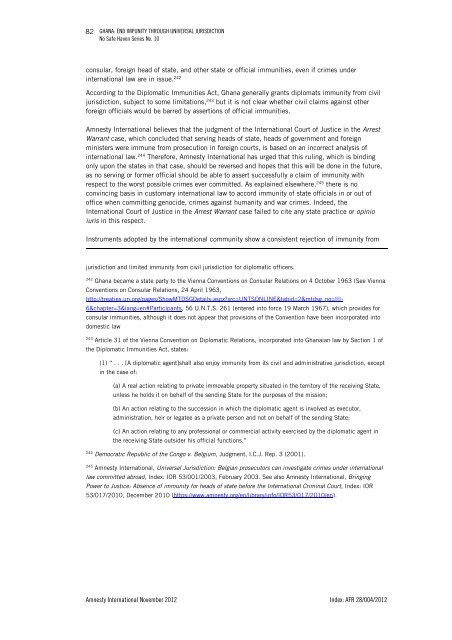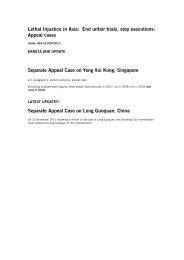Ghana - Amnesty International
Ghana - Amnesty International
Ghana - Amnesty International
Create successful ePaper yourself
Turn your PDF publications into a flip-book with our unique Google optimized e-Paper software.
82GHANA: END IMPUNITY THROUGH UNIVERSAL JURISDICTIONNo Safe Haven Series No. 10consular, foreign head of state, and other state or official immunities, even if crimes underinternational law are in issue. 242According to the Diplomatic Immunities Act, <strong>Ghana</strong> generally grants diplomats immunity from civiljurisdiction, subject to some limitations, 243 but it is not clear whether civil claims against otherforeign officials would be barred by assertions of official immunities.<strong>Amnesty</strong> <strong>International</strong> believes that the judgment of the <strong>International</strong> Court of Justice in the ArrestWarrant case, which concluded that serving heads of state, heads of government and foreignministers were immune from prosecution in foreign courts, is based on an incorrect analysis ofinternational law. 244 Therefore, <strong>Amnesty</strong> <strong>International</strong> has urged that this ruling, which is bindingonly upon the states in that case, should be reversed and hopes that this will be done in the future,as no serving or former official should be able to assert successfully a claim of immunity withrespect to the worst possible crimes ever committed. As explained elsewhere, 245 there is noconvincing basis in customary international law to accord immunity of state officials in or out ofoffice when committing genocide, crimes against humanity and war crimes. Indeed, the<strong>International</strong> Court of Justice in the Arrest Warrant case failed to cite any state practice or opinioiuris in this respect.Instruments adopted by the international community show a consistent rejection of immunity fromjurisdiction and limited immunity from civil jurisdiction for diplomatic officers.242<strong>Ghana</strong> became a state party to the Vienna Conventions on Consular Relations on 4 October 1963 (See ViennaConventions on Consular Relations, 24 April 1963,http://treaties.un.org/pages/ShowMTDSGDetails.aspx?src=UNTSONLINE&tabid=2&mtdsg_no=III-6&chapter=3&lang=en#Participants, 56 U.N.T.S. 261 (entered into force 19 March 1967), which provides forconsular immunities, although it does not appear that provisions of the Convention have been incorporated intodomestic law243Article 31 of the Vienna Convention on Diplomatic Relations, incorporated into <strong>Ghana</strong>ian law by Section 1 ofthe Diplomatic Immunities Act, states:(1) “ . . . [A diplomatic agent]shall also enjoy immunity from its civil and administrative jurisdiction, exceptin the case of:(a) A real action relating to private immovable property situated in the territory of the receiving State,unless he holds it on behalf of the sending State for the purposes of the mission;(b) An action relating to the succession in which the diplomatic agent is involved as executor,administration, heir or legatee as a private person and not on behalf of the sending State;(c) An action relating to any professional or commercial activity exercised by the diplomatic agent inthe receiving State outsider his official functions.”244Democratic Republic of the Congo v. Belgium, Judgment, I.C.J. Rep. 3 (2001).245<strong>Amnesty</strong> <strong>International</strong>, Universal Jurisdiction: Belgian prosecutors can investigate crimes under internationallaw committed abroad, Index: IOR 53/001/2003, February 2003. See also <strong>Amnesty</strong> <strong>International</strong>, BringingPower to Justice: Absence of immunity for heads of state before the <strong>International</strong> Criminal Court, Index: IOR53/017/2010, December 2010 (https://www.amnesty.org/en/library/info/IOR53/017/2010/en).<strong>Amnesty</strong> <strong>International</strong> November 2012 Index: AFR 28/004/2012
















